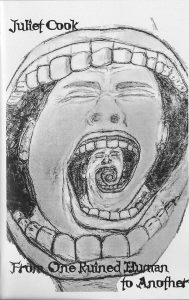Juliet Cook is a widely published, prolific writer, both as an individual poet and as collaborator with poet j/j hastain. She also runs a one-woman indie press, Blood Pudding Press, which is known for its collector’s item chapbooks. She edits and publishes the internet-based, blog-style literary magazine, Thirteen Myna Birds.
I caught up with Juliet not only to talk about her new chapbook From One Ruined Human to Another (CWP Collective Press/Dark Particle 2018), but to learn about her creative processes.
Eileen Murphy (“EM”): I notice that you do it all where poetry and art are concerned. To me, your literary gigs look effortless. How do you juggle all these roles?
Juliet Cook (“JC”): My various creative projects are by no means effortless and I often get overwhelmed and have to work to calm myself down without falling too far behind. If I receive more than a few unexpected interruptions in a relatively short span of time, it can become very difficult for me to keep up with my own projects. I have a pretty slow process and really dislike feeling pushed or pulled or rushed.
I guess the reason it might appear that I accomplish a variety of different things is because even though my process is slow, I’m very regularly and frequently working on one thing or another at my own pace. I’m not a multitasker; I work on things one at a time and tend to alternate between reading, writing, revising, submitting, publishing, promoting, and art.
One thing I can say that I wouldn’t have said in the past is that I live by myself and love it that way. It offers me a lot of my own time and space to use how I choose to use it, without having the expectations and opinions of others living right next to me all the time.
EM: You also do artwork (sold on Etsy and by Blood Pudding Press). But which comes first in your life, poetry or art?
JC: Poetry comes first for me; it’s been my primary passion for years. My visual art is more in-between and semi-sporadic.
I had a time in my late thirties, after suffering from an unexpected stroke, during which I had to relearn to read and write—and my own poetry writing was temporarily set aside. During that time, I focused on visual art more than writing and my visual art felt like abstract poetry. My stroke caused some brain damage and seemed to cause my brain to be more visual.
With that said, writing (especially poetry) is still my preferred form of personal creative expression, as well as my most ongoing and consistent and well-loved form of communication.

EM: Your recent chapbook, From One Ruined Human to Another (CWP Collective Press/Dark Particle 2018), features several poems entitled “Not a Baby Doll.” Why? What do dolls mean to you as a poet?
JC: I feel like some people view or treat other people like dolls, in certain ways. Or maybe not specifically like dolls, but like un-meaningful, un-individualistic, largely emotionless, relatively heartless bodies that can just be broken into little pieces, thrown away, heaped in the trash, or tossed in a garbage barrel with a bunch of other quickly cut off doll heads.
Dolls can be easily handled and controlled in a way that reminds me of how some parents feel the need to handle and control their children—and how some husbands feel the need to handle and control their wives (or vice versa)—and how some adults feel the need to attack other adults who aren’t part of the same doll squad or doll cauldron as them.
Maybe some dolls are secretly haunted and plotting an insurrection. Maybe some dolls are easily cracked and broken. Maybe some dolls are scared. Maybe some dolls are evil. Maybe most dolls are relatively meaningless in the vast scheme of things, but want to be in charge of something.
EM: Did you always want to be a writer?
JC: I was always focused on creativity. I liked writing as a kid, I started to especially love poetry in my mid teens, and when I was about to start college, I briefly considered getting my degree in journalism, but then rather quickly decided on creative writing.
 EM: Tell me about your creative process. I’m curious. What’s your typical day like?
EM: Tell me about your creative process. I’m curious. What’s your typical day like?
JC: My process is messy and atypical and so is my home. I have my own organizational style, but even that looks messy. I think about and work on poetry in one way or another almost every day, but I certainly don’t specifically write every day, nor do I have a set time. I rather sporadically alternate between writing, revising, reading, submitting, promoting, publishing, and so on.
I’m a big list maker, make my lists way too long, almost never get an entire list done in a day, but still write another list the next day. I have 100’s of stacks of partially completed lists in my home.
EM: So, what’s next for you?
JC: My most recently compiled poetry chapbook, “The Rabbits With Red Eyes,” is tentatively scheduled to be published by Ethel Zine & Micro Press early next year. Blood Pudding Press has a new chapbook coming soon, featuring poems by Daniel G. Snethen. And I’m still poetically collaborating with j/j hastain (we might be able to start assembling our second full-length manuscript soon), reading other people’s poetry (including submissions for Thirteen Myna Birds), and writing my own poetry.
From One Ruined Human to Another by Juliet Cook may be purchased: https://darkparticlepress.com/bookstore-1/from-one-ruined-human-to-another
